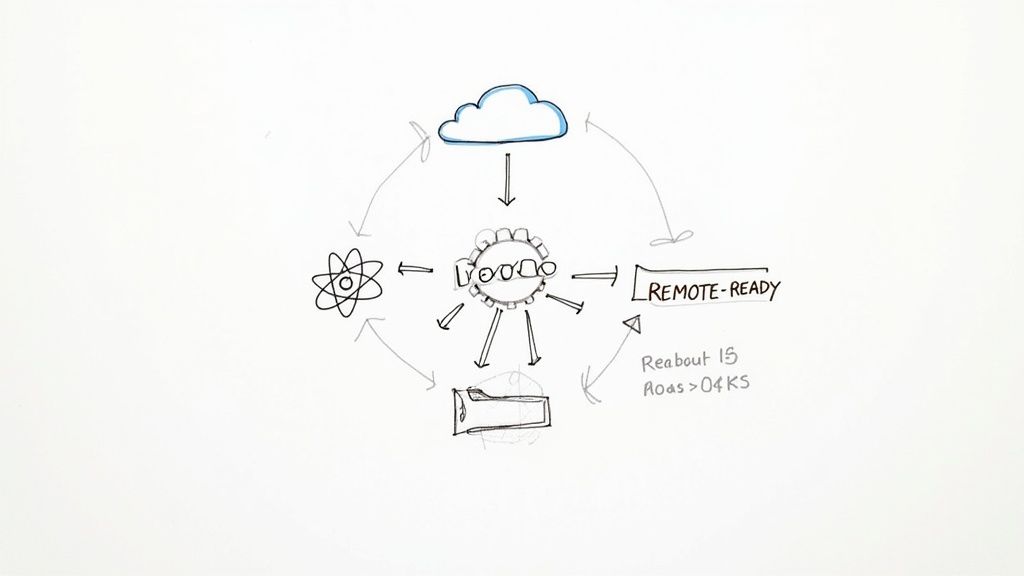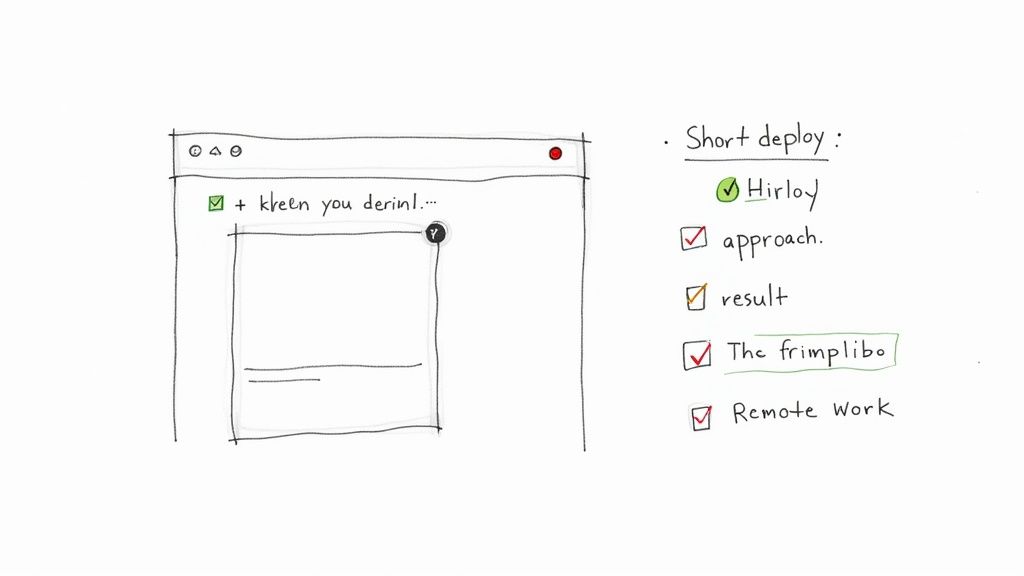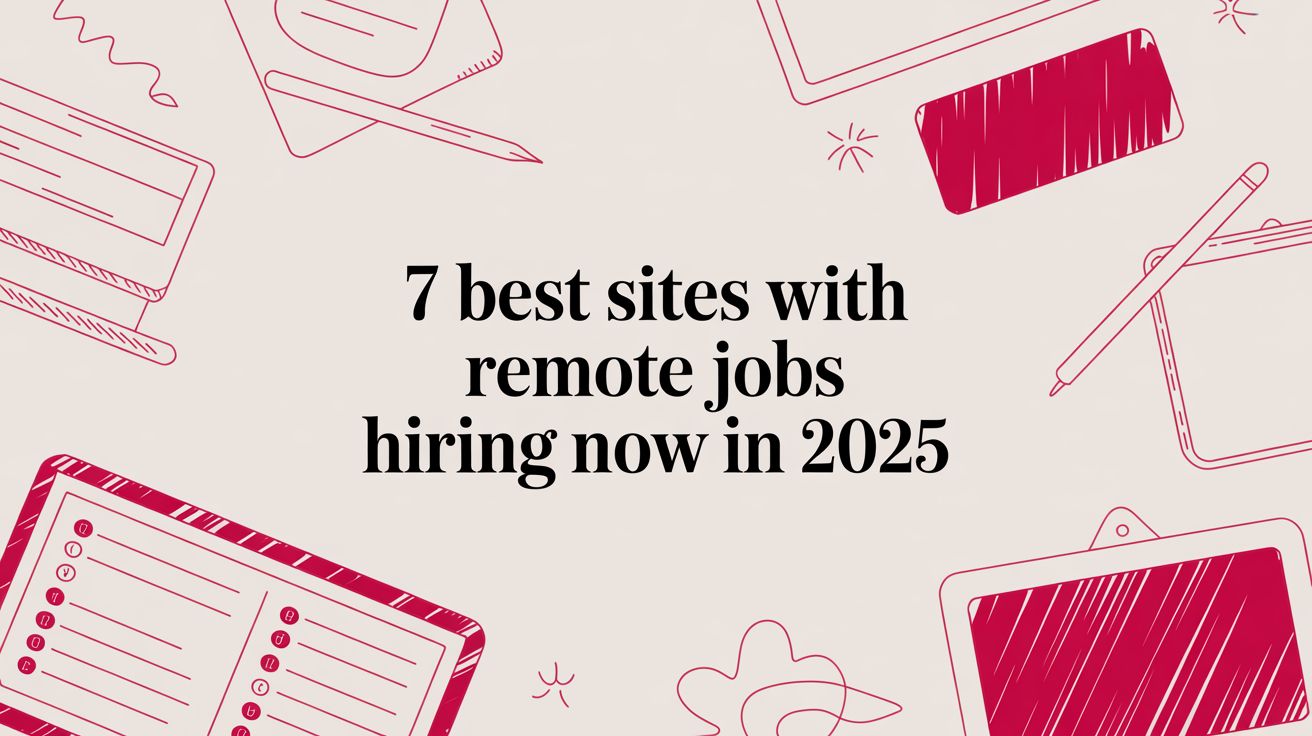Trying to land an entry level software engineer jobs remote feels tougher than ever, but it’s absolutely doable if you have the right game plan. The trick is to understand how the market has shifted toward more experienced hires and then position yourself as a low-risk, high-value candidate who can hit the ground running with minimal hand-holding.
The Reality of Today’s Remote Tech Job Market

Dreaming of launching your software career from your home office? It’s a great goal, but the landscape has changed. A lot.
Many companies that went all-in on remote work are now hesitant to bring junior developers into that environment. They’ve found it’s often easier to hire mid-level engineers who already know how to operate independently and require less mentorship. This preference creates a huge hurdle for new grads and career-changers. You’re not just competing with your peers anymore; you’re up against a global talent pool.
Understanding the Hiring Slowdown
Let’s look at the numbers, because they paint a clear picture. Graduate hiring at major U.S. tech companies has plummeted by more than 50% from what it was before 2020. This isn’t just a U.S. trend, either. Junior developer roles in the U.K. have dropped by nearly a third since 2022, a shift that hits remote positions the hardest. The full Talent500 report on entry-level developer jobs has even more data on this.
What this really means is that just having a degree or a bootcamp certificate isn’t enough to get you in the door. Employers are looking for people who can prove their value right away.
The modern job search for a junior remote role isn’t about just applying; it’s about proving you can operate like a mid-level engineer in terms of autonomy and problem-solving, even if your technical skills are still developing.
The Impact of AI and Automation
There’s another big player changing the game: AI. Coding assistants are getting really good at handling the routine tasks that used to be the bread and butter of a junior developer’s day. Things like writing boilerplate code, generating unit tests, or debugging simple issues are increasingly automated.
Because of this, companies now expect new hires to tackle more complex problems much sooner in their careers. This shift doesn’t just change the job description; it also impacts what companies are willing to pay. Getting a handle on the financial side is key, and you can learn more in our detailed guide to the average remote software engineer salary.
To have a real shot, you need a strategy that meets these new challenges head-on.
Building Skills That Remote Companies Actually Want

In a remote-first world, your computer science degree or bootcamp certificate is the starting line, not the finish line. Hiring managers are looking for concrete proof you can deliver quality work independently from day one.
This means you need to get laser-focused on the specific, in-demand skills that remote companies are actively hiring for right now. Forget the generic advice—we’re talking about tangible competencies like hands-on experience with cloud platforms, modern frameworks, and a solid grasp of development operations.
Go Beyond the Basics with Cloud and DevOps
Simply knowing a programming language isn’t enough to land those entry level software engineer jobs remote positions. Companies need engineers who understand the entire development lifecycle, from writing the first line of code to deploying and maintaining it in a cloud environment.
This is where cloud and DevOps skills become your biggest advantage. Instead of just listing “JavaScript” on your resume, you need to show you can build and deploy a full-stack application using the tools of the trade.
Master a Cloud Platform: Get comfortable with either Amazon Web Services (AWS) or Microsoft Azure. You don’t need to be an expert, but you should know how to deploy a simple application, manage a database, and set up basic infrastructure. An AWS Certified Cloud Practitioner certification can be a huge differentiator here.
Understand CI/CD Pipelines: Get familiar with tools like GitHub Actions or Jenkins. Knowing how to automate the build, test, and deployment process shows you understand modern software delivery and can plug into a team’s workflow immediately.
Your goal is to demonstrate that you’re not just a coder but a builder. A junior engineer who can talk about deploying a containerized application to AWS is far more valuable than one who has only ever run code on their local machine.
Prioritize In-Demand Frameworks and Languages
Let’s be honest: the tech stack matters. Foundational knowledge is important, but remote companies often look for proficiency in specific frameworks that help them build and scale quickly. The best way to figure out what’s hot is to scour job descriptions.
You’ll almost certainly see a heavy emphasis on front-end frameworks like React or Vue.js and back-end technologies like Node.js. Practical experience is everything. Employers are showing a clear preference for juniors who can point to open-source contributions or cloud certs over those relying solely on academic credentials.
This trend is all about skills-based hiring. It’s not just about what you know, but what you can do.
Knowing which skills to focus on is half the battle. If you’re trying to decide where to invest your time, our guide on the best programming languages to learn breaks down exactly what’s in demand for remote roles right now. This strategic approach ensures you’re not just learning to code, but learning what gets you hired.
Crafting a Portfolio That Proves Remote Readiness

Let’s be blunt: for entry level software engineer jobs remote, your portfolio is your single most important asset. It’s the ultimate proof that you can actually build, deploy, and manage applications on your own—a non-negotiable for any company hiring remotely.
Think about it from the hiring manager’s perspective. They’re looking for low-risk hires who won’t need constant hand-holding. A strong portfolio is a window into your self-sufficiency, showing them you can take an idea from concept to completion without someone looking over your shoulder. It shifts the conversation from what you claim you can do to what you’ve already done.
Choosing Projects With Impact
Quality beats quantity, every single time. One complex, end-to-end application will always be more impressive than ten half-finished tutorial projects. The key is to build something that solves a real problem, even a small one. This shows initiative and product sense, two things that are incredibly hard to teach.
Your mission is to showcase skills that scream “remote-ready.” Focus your energy on projects that include:
- A full-stack application: Show you get the whole picture by building something with a clear front end, back end, and database.
- API integration: Pull in data from a third-party API, like a weather service or payment processor. This is a day-to-day task in most software roles.
- Deployment to a cloud service: Get your app live on a service like Vercel, Heroku, or AWS. A live URL is tangible proof you understand the full development lifecycle.
So, instead of another to-do list app, maybe build a collaborative project management tool. Add user authentication, connect it to a live database, and wrap it in a clean, responsive UI. That kind of project tells a recruiter you’re not just dabbling; you’re serious.
Of course, having great projects means nothing if no one sees them. Learning the ropes of creating a professional website is how you put your work in the best possible light.
Your portfolio is the foundation for attracting remote employers. The table below breaks down the essential elements that will make yours stand out.
Key Elements of a Standout Remote-Ready Portfolio
| Portfolio Element | Why It’s Important for Remote Roles | Example Implementation |
|---|---|---|
| Live, Deployed Projects | Proves you can complete the entire development lifecycle independently. | A personal finance tracker deployed on Vercel with a custom domain. |
| Detailed README Files | Demonstrates strong asynchronous communication skills and empathy for other developers. | A README with sections for “What it does,” “Tech Stack,” “How to Run Locally,” and “Challenges Faced.” |
| Clean, Version-Controlled Code | Shows professionalism and an understanding of collaborative development workflows (like Git). | A GitHub repository with a clear commit history and logical branching strategy. |
| A Full-Stack Application | Shows a holistic understanding of how different parts of an application work together. | A recipe-sharing app with a React front end, a Node.js/Express back end, and a PostgreSQL database. |
| Third-Party API Integration | Reflects your ability to work with external services and documentation. | A travel planning app that integrates with the Google Maps API for location data. |
Focusing on these elements transforms your portfolio from a simple gallery of projects into a powerful argument for why you’re the right candidate for a remote role.
Documenting Your Process And Code
Building impressive projects is only half the job. The other half is presenting them in a way that makes a hiring manager’s life easy. Your code needs to be clean and readable, but it’s your documentation that will truly set you apart.
Every project on your GitHub needs a detailed README file. Period.
A well-documented project shows you can communicate asynchronously—a core skill for any remote employee. It proves you think about other developers who might have to read or maintain your code in the future.
Your documentation should clearly explain what the project does, the technologies you used, and how someone can get it running on their own machine. But don’t just list features. Tell the story behind the project. Why did you choose that specific tech stack? What was the biggest hurdle you faced, and how did you solve it? This narrative turns a simple coding exercise into a compelling case study of your problem-solving abilities.
With a polished portfolio in hand, you’re ready to start applying with confidence. For more on leveraging it, check out our guide on https://remotefirstjobs.com/blog/how-to-find-programming-jobs that match your impressive new skillset.
A Smarter Strategy for Finding and Applying to Jobs
Just blasting your resume out to hundreds of job postings is a surefire way to get frustrated. If you really want to land a quality entry level software engineer jobs remote, you have to be smarter and more targeted with your energy. That means getting off the massive, catch-all job boards and focusing on where the real remote-first opportunities are hiding.
Let’s be real for a second. The software development field is projected to grow by 17% between 2023 and 2033, which sounds great. But those numbers, roughly 327,900 new jobs, are heavily skewed toward mid-level and senior roles.
Entry-level positions, especially the fully remote ones everyone wants, are much, much harder to come by. This scarcity makes your application strategy absolutely critical.
Go Niche with Your Job Search
Stop wasting hours scrolling through general sites like Indeed or ZipRecruiter. It’s time to pivot to platforms built specifically for remote work. Niche job boards are your secret weapon—they’re less crowded and feature curated listings from companies that are already all-in on a remote culture. This one shift can dramatically improve the quality of the jobs you find.
- Focus on Remote-First Boards: These sites do the heavy lifting for you, filtering out all the hybrid and in-office noise.
- Look for Vetted Companies: Many of the best niche boards actually vet the companies that post jobs, which cuts down on scams and low-quality listings.
- Find Better Culture Fits: Companies on these platforms are usually way more transparent about their remote policies, benefits, and what they expect in terms of work-life balance.
Finding the right platform can be a total game-changer. We’ve actually put together a detailed guide on the best remote job websites to point you toward the ones that are perfect for your search.
Tailor Your Application to Each Role
Once you’ve found a few promising openings, you can’t just send the same old resume. Generic applications get spotted a mile away and are the first to hit the virtual trash bin. Recruiters want to see that you’ve done your homework and are genuinely excited about their company and their specific role.
For every single application, you need to prove you’re ready for remote work. This is about more than just your technical chops.
Hiring managers for remote roles aren’t just evaluating your coding skills; they are assessing your ability to communicate clearly, manage your own time, and collaborate effectively without being in the same room. Your resume and cover letter must tell this story.
Customize your resume to mirror the language in the job description. Did they mention “asynchronous communication”? Make sure your project descriptions highlight how you used tools like Slack, Jira, or detailed README files. Do they talk about “autonomy”? Describe a project you took from concept to completion on your own initiative.
This tailored approach shows you’re not just another qualified coder—you’re the right candidate for a remote team. To help make this process smoother, tools like JobCopilot can help you efficiently find openings that are a great match for your skills.
Mastering the Remote Interview Process
 Let’s be real: a remote interview is a completely different beast. It’s not just a test of your coding chops; it’s an audition for how you’ll operate as a remote teammate. Hiring managers are trying to gauge your communication, problem-solving, and collaboration skills through a screen, and you need to be ready for that.
Let’s be real: a remote interview is a completely different beast. It’s not just a test of your coding chops; it’s an audition for how you’ll operate as a remote teammate. Hiring managers are trying to gauge your communication, problem-solving, and collaboration skills through a screen, and you need to be ready for that.
Success starts long before you ever click that “Join Meeting” link. It begins with creating a professional environment that tells the interviewer you’re serious about the opportunity. You don’t need a fancy home office, just some thoughtful preparation.
Setting the Stage for Success
Your interview space sends a powerful message. A clean, quiet backdrop shows you’re organized and respectful of everyone’s time.
Here’s how to nail the basics:
- Do a tech check. At least an hour beforehand, test your camera, microphone, and internet connection. Nothing kills your momentum faster than scrambling to fix a tech issue when you should be introducing yourself.
- Curate your background. A neutral wall or a tidy bookshelf is perfect. Just avoid a messy room or distracting posters that might signal a lack of organization.
- Lock it down. Give your family or roommates a heads-up that you need uninterrupted time. Close every unnecessary tab on your computer—you don’t want a random notification derailing your train of thought.
This prep work shows you have foresight and professionalism, two traits every remote company is looking for. Once you’ve handled the logistics, you can focus on the art of communicating remotely.
A remote interview isn’t just about getting the answers right. It’s about proving you can build rapport and explain complex ideas clearly without being in the same room. Your ability to connect over video is a direct preview of how you’ll perform on the job.
Excelling in Remote Technical Challenges
The technical portion, especially a live pair-programming session, is where a lot of candidates fall flat. Without a physical whiteboard to lean on, your ability to articulate your thought process becomes your single most important tool. You absolutely have to narrate your problem-solving journey out loud.
Explain why you’re reaching for a specific data structure or what edge cases you’re considering. This verbal stream-of-consciousness shows the interviewer how you think, which is often way more valuable than just spitting out a perfect solution.
Finally, show up with sharp questions about their remote culture. Ask about their communication norms, how they mentor junior engineers, or what their onboarding process actually looks like for new remote hires. These kinds of questions prove you’ve thought deeply about the realities of working remotely.
For more strategies to crush your next virtual call, check out our guide packed with practical remote interview tips. By showing you get these nuances, you prove you’re not just looking for a job—you’re looking for the right remote team.
Answering Your Burning Questions About Remote Software Engineer Jobs
When you start looking for entry level software engineer jobs remote, a ton of questions pop up. It’s totally normal. Let’s get you some straight answers so you can move forward with a bit more confidence.
Think of this as the practical, no-fluff advice I wish I had when I started. Getting these details right can seriously change the game for your job hunt.
Will I Get Paid Less for a Remote Job?
This is the big one, right? And the honest answer is… it depends.
Some companies still cling to location-based pay, meaning they’ll adjust your salary based on the cost of living where you are. So, a developer in San Francisco might get a higher number on paper than someone doing the exact same job from a small town in the Midwest.
But here’s the good news: a growing number of remote-first companies are ditching that model. They’re moving to location-agnostic pay, offering a set salary band for a role, no matter where you plug in your laptop.
When you’re interviewing, don’t be shy about asking how they calculate compensation for their remote team. It’s a perfectly fair question and shows you’re thinking like a pro.
Your real leverage comes from the value you bring to the table. If you’ve got a killer portfolio and skills that are in high demand, you’ll have a much stronger negotiating position, even if the company’s policy is to adjust for location.
How Can I Stand Out in a Global Talent Pool?
Applying for a remote job isn’t like applying for a local one. Suddenly, you’re not just competing with folks in your city; you’re up against talented developers from all over the world. That means your technical skills alone might not be enough to get you noticed.
So, how do you break through the noise?
- Find Your Niche. Don’t just be a “JavaScript developer.” Become the person who’s obsessed with accessibility in React, or the dev who geeks out on performance optimization for Node.js. Specialization makes you memorable.
- Master Asynchronous Communication. Your resume, cover letter, and especially the documentation in your portfolio projects are your first impression. Make them crystal clear. This is your chance to prove you can communicate effectively without needing a meeting.
- Build a Personal Brand. You don’t have to become a tech influencer, but you should be visible. Contribute to an open-source project, write a blog post about a tough problem you solved, or just be a helpful voice in a Discord or Slack community.
These things signal that you’re proactive and genuinely passionate, two of the most critical traits for any successful remote employee.
Are Entry-Level Remote Jobs a Myth?
They’re not a myth, but finding one is definitely tougher than finding an in-office or hybrid gig. Let’s be real: companies get nervous about mentoring junior developers from a distance. They worry it’ll be too hard.
Because of this, they’re looking for junior candidates who show an unusual level of autonomy and self-motivation.
Your entire application needs to be a direct answer to that unspoken concern. From your portfolio projects to how you talk about them in an interview, you need to scream, “I’m a self-starter who can figure things out.” If you can prove you won’t need constant hand-holding, you’ll clear one of the biggest hurdles standing between you and that first remote role.
Ready to find a remote job that’s the perfect fit for you? Remote First Jobs makes it easy to discover thousands of verified, spam-free listings from trusted remote-first companies. Start your search today and take the next step in your career.






